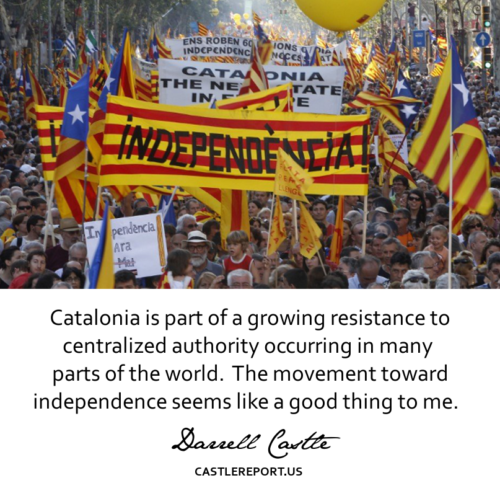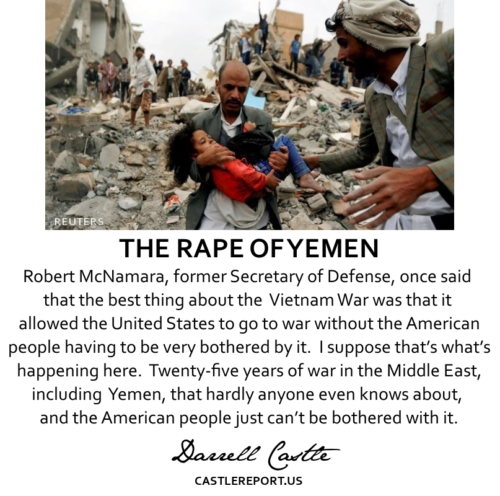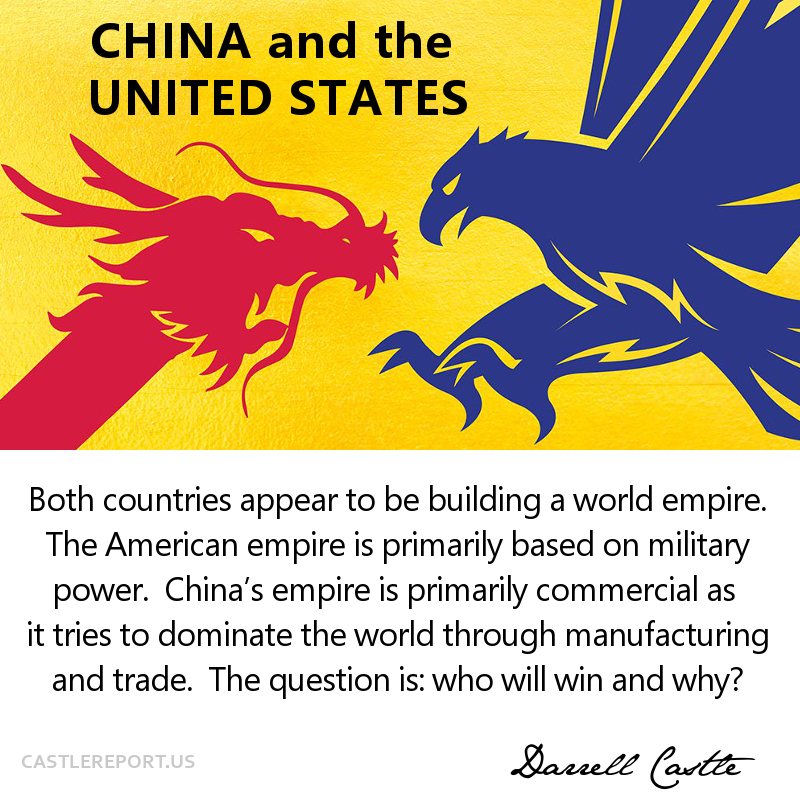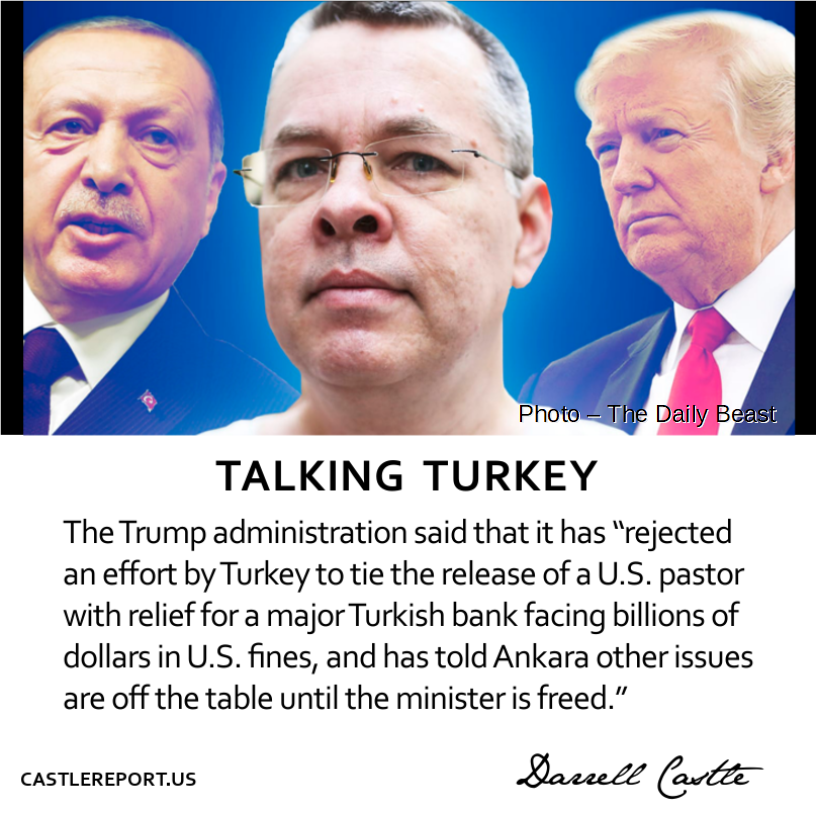
Catalonia Really Wants To Be Free
Podcast: Download
Darrell Castle talks about revolution in Spain as the region of Catalonia seeks independence.
Transciption / Notes
CATALONIA REALLY WANTS TO BE FREE
Hello this is Darrell Castle with today’s Castle Report. Today is Friday, October 6, 2017, and on today’s Report I will be talking about the nation of Spain and the struggle of one of its regions, or provinces, to become an independent nation. We start with a little background.
Prior to the start of World War Two, the Spanish Region of Catalonia sought to establish a Republic in Spain, which was was allied in its struggle with the Soviet Union. The opposing force was Spanish Dictator Francisco Franco who was allied with Nazi Germany. Adolph Hitler had begun rearming Germany from its defeat in World War l, and the Spanish Civil War gave him a chance to test his new weapons, especially the Luftwaffe or German Air Force. The new airplanes used in Spain caused Great Britain to take notice and start its own re-armament. The Spanish Civil War became a cause for celebrity attention around the world. Ernest Hemingway went there and wrote “For Whom The Bell Tolls” about it.
Franco continued as Spanish head of state until his death in 1975. After his death a Constitutional Monarchy was established with 17 autonomous regions, one of which was Catalonia. The autonomy of these regions was spelled out in the Spanish Constitution of 1978, but the Constitution did not allow for complete independence from Spain. Since that time the region of Catalonia has been in a struggle with the Spanish Government in Madrid. The two sides can never agree on how much autonomy each region has or even what is meant by the term autonomy. The Catalan people have voted in non binding referendums many times and each vote is overwhelmingly for independence.
Each time the Spanish Government goes to the Constitutional Court for a ruling that the referendum is illegal and unconstitutional, and each time they get it. Spain will not voluntarily let go of Catalonia, the nation’s most valuable and richest region. Catalonia is not the only Spanish Region to consider independence. The Basque region is watching these events very closely.
Catalonia is located on the northeast corner of Spain. It borders France and the Mediterranean Coast, and includes the city of Barcelona. It is Spain’s number one tourist region, from which comes its highest tax revenue. The tax system is Catalonia’s reason for wanting independence, and has been since the Constitution of 1978. The Catalans are upset because more than a majority of their taxes are collected from them but used in other regions. Catalonia is being used as a tax farm by the Spanish Government to fund its welfare and vote-buying schemes in other regions.
In a nutshell, the real problem with Catalonia, and Spain in general, is one of demographics. Spain has the lowest fertility rate in Europe and its population is rapidly aging. While Spain struggles to deal with an unproductive and aging population the European Union requires the immigration of a few million immigrants supposedly to replace Spanish low wage workers, but who in reality, fill the welfare rolls. Scotland could not afford to vote for independence from Great Britain because of all the subsidies it receives but in Spain the relationship is reversed and Catalonia subsidizes the Spanish Government.
The Catalan people have come to the conclusion that they would be better of without the rest of Spain so they are pushing independence as far as it will go. Other regions such as the Basque region watch and wait for their own opportunity. Spain is in a very difficult spot because if Catalan is allowed to be free, other regions will follow suit and the Spanish Government will have no way to pay the debt service on the billions it has borrowed from the European Central Bank and the German Banks.
In its desperation to keep Catalonia peaceably, Spain has offered to pay billions to the region. That is money that only the banks can provide so we have a typical banker story. The banks hold the Spanish Government in a state of virtual bondage. The Catalonians told Spain sure we’ll take your money but only if there are no political strings attached so the deal fell through. The Government offers whatever you want, except what you absolutely wish, and that is freedom.
The European Union also seems desperate to keep Catalan from achieving independence, even though the region is adamant that it wants to remain a part of the Union. They want independence on the one hand but apparently not complete independence, because they want to remain a part of a Union that would to a certain extent control their economy, border, etc.
Catalonia is a threat to the European Union just as Brexit was, and is, a threat. Angela Merkel, the German Chancellor and unofficial leader of the European Union, and increasingly with Emmanuel Macron of France, have been outspoken against independence for Catalonia. It would make it more difficult for Spain to repay the European banks, and such movements threaten the control that is supposed to be imposed collectively from Brussels. The EU already has its hands full with Hungary, Poland and the Czech Republic in defiance of EU regulations and orders on immigration.
Catalonia set a referendum for last Sunday, October 1, and this time the vote was to be binding. The Spanish Constitutional Court ruled the vote illegal and invalid before it was held. The Spanish Government had two choices with the vote; allow the vote but campaign against it, pointing out to the people the disadvantages of independence and the advantages of remaining Spanish, or send in the Guardia Civil, National Police, to break up the election. The government, as governments tend to do, chose the dumbest possible course of action sending in the Guardia Civil to brutally suppress the vote.
People guilty of nothing but standing in line to vote were attacked and almost a thousand were injured badly enough to go to the hospital. They tried to confiscate the ballot boxes but the people organized and resisted as best they could. This was not a top-down revolution led by the elites but a widespread phenomenon involving all aspects of society including the Catholic Church. All 400 Catholic clerics in Catalonia signed the demand for independence. I suppose the Government thought that the Catalonians would be so intimidated that they would just abandon their efforts but the repression had the opposite effect. The determination of the region was bolstered and now Catalonia will move unilaterally to declare independence this Monday the 9th of October.
The Government has refused to negotiate and has said that it will trigger Article 155 of the Spanish Constitution, the so-called nuclear option. Article 155 has never been used before, and as a counter, Catalonia said that it will request that Article 7 of the European Union Treaty be invoked. Article 155 would effectively end Catalan’s autonomous status and the Region would then be ruled not by its own elected officials but by those in Madrid. Article 7 requires suspension from the EU of any member state that uses military force on its own people.
Spain, already suffering severe economic troubles with unemployment of the young running above 38%, and deeply in debt, is now facing a possible catastrophe. It simply cannot live without Catalonia and yet it appears that it will have to, or brutally repress a revolution. No investors want to buy Spanish bonds so rates have to soar at a time when there is no money to pay higher interest. Should Catalonia be successful, investment in Spanish paper might cease completely. It’s hard to see how the Government in Madrid could survive under those circumstances, so Article 155 becomes a real probability.
I would not call this a “civil war” because it is not yet a war, and even if it is, the term “civil war” does not apply. A war for independence is not a civil war in the true sense. The American Civil War was not really a civil war because that is where two groups fight a war seeking control of the same government. It was, rather, a war for independence just as Catalonia is about to engage in. Revolution would be an even better term.
Catalonia is part of a growing resistance to centralized authority occurring in many parts of the world. The movement toward independence seems like a good thing to me. How would the United States Government handle such a movement here? Perhaps we’ll find out somewhere down the road.
Breaking up is hard to do but no relationship is usually better than a bad relationship.
At least that’s the way I see it,
Until next time folks,
This is Darrell Castle,
Thanks for listening.





